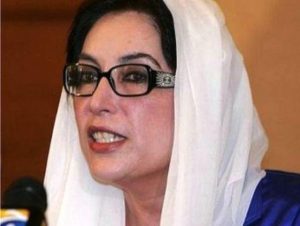One of the most controversial trials in Pakistani history has ended. The former military dictator Pervez Musharraf was declared a fugitive and his property ordered confiscated after he failed to turn up in court his role in the assassination 10 years ago of Ms Benazir Bhutto.
Two high-ranking police officials were sentenced on Thursday to 17 years in prison but the verdict, stops short of sentencing anyone for the murder. The police officials were found guilty only of negligence and mistreatment of evidence, and five accused militants were acquitted.
By failing to bring its most prominent suspect, ex-president Musharraf, to justice, the anti-terrorism court in Rawalpindi set “a dangerous precedent,” said Saroop Ijaz, a lawyer and researcher with Human Rights Watch in Pakistan. “This is a farce. Musharraf is in plain sight. And he regularly appears on television.”
Musharraf, who is accused of conspiring to murder the former prime minister, has been in self-imposed exile in Dubai since 2016, when he left the country after a period in house arrest, after the ministry of interior lifted his travel ban.
“10 years later and we still await justice. Abettors punished but those truly guilty of my mothers murder roam free,” one of Bhutto’s daughters, Aseefa, said on Twitter. Bhutto’s son, Bilawal, called the result “disappointing and unacceptable”.
In a move that surprised some observers, the court also acquitted five suspects linked to the Pakistani Taliban (TTP), who had been accused of being involved in the conspiracy to kill Bhutto.
“The acquittal of al-Qaida/Taliban terrorists against whom evidence has been provided is most surprising. On its face it seems a triumph of al-Qaida militants,” Bhutto’s party, the PPP, said in a written statement.
The PPP claims that Musharraf himself was behind Bhutto’s murder. He has denied the allegations.
During her career, Bhutto, a two-term prime minister, was celebrated in the west as a beacon of democracy, and much feted for her glamorous reputation. People Magazine named her one of the world’s 50 most beautiful people.
In the region, she was equally idolised by supporters as a champion for women’s rights, and attacked by opponents for corruption, incompetence and nepotism.
Born into an aristocratic Karachi family, Bhutto studied at Cambridge, Harvard and Oxford. She took over the reigns of the Pakistan People’s party (PPP) in 1987, years after its founder, her father, was executed by the military dictator, Zia ul-Haq. In 1988, she became the first woman democratically elected to lead a Muslim-majority nation.
After her last term, besieged by corruption allegations, she fled the country, only to return eight years later to a warm welcome by the Pakistani people. She was a strong contender for the elections.
It was during one of her public rallies, leading up to the 2008 elections, that Bhutto was first attacked by terrorists who had planted two bombs in the crowd. Bhutto survived that attack, which killed 149 people, but in another rally two months later, on 27 December in Rawalpindi, her car came under fire, before a suicide bomber detonated nearby.
Bhutto died in her car under circumstances that were later disputed. An initial investigation claimed she died from fracturing her skull on the sunroof latch in the blast. However, her party denied those claims, insisting that she died from gunshot wounds.
Prior to her death, Bhutto said a sinister cabal of intelligence officers and presidential aides were plotting to kill her, and that Musharraf should be blamed if anything were to happen to her. PPP has always maintained that line.
The police officers are the only two people to have been convicted over Bhutto’s murder. Saud Aziz, then police chief of Rawalpindi, was found guilty of security negligence, and for damaging evidence by having the attack site hosed down soon after the attack. Khurram Shehzad, a former police superintendent, was also sentenced for mishandling the crime scene.
By failing to take adequate security measures, Aziz abetted the crime, public prosecutor Azhar Chaudhry told the Guardian. Chaudhry also said there was “more than sufficient evidence” against two of the accused TTP-suspects – Rafaqat Hussain and Husnain Gul – and that he would appeal their acquittal.
The decade-long legal process, spanning more than 300 hearings from 121 witnesses, was marred by irregularities and delay. In 2013, the chief prosecutor investigating Musharraf in the Bhutto murder case was shot dead in his car in Islamabad.
Seven TTP militants who were under accusation in the case were killed in military operations since 2007, including its leader, Baitullah Mehsud, who was killed in a drone attack in 2009. Many thought his death was the end of the process.
“That was in my view the Pakistani state washing its hands of this case,” said Ijaz.
By blaming security forces for Bhutto’s murder, Thursday’s verdict gives some credence to Bhutto’s supporters, though to many of them, justice cannot be served until Musharraf is brought home to stand trial.
“Two police officers have been convicted and sentenced. But the question as to who had ordered them to wash out the place of occurrence and destroy crucial evidence has not been addressed,” said the PPP. “The conviction of the police officers will remain weak unless those giving orders to them were also tried and convicted.”


